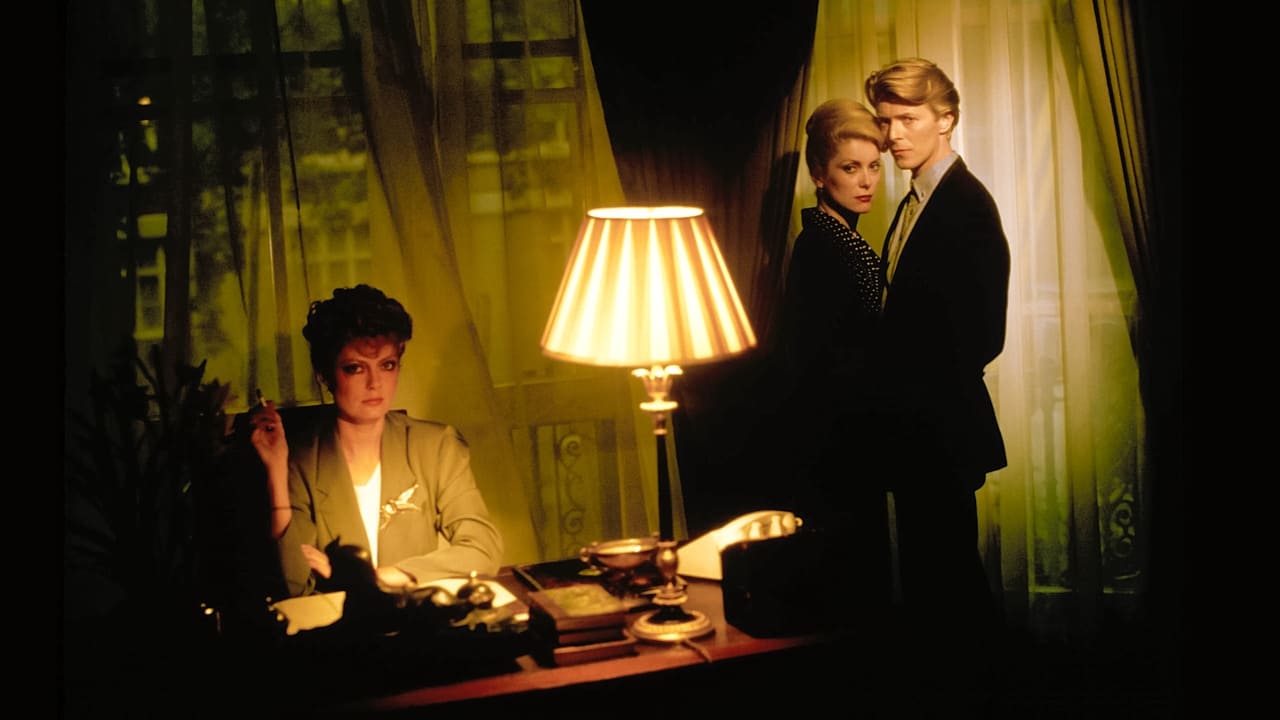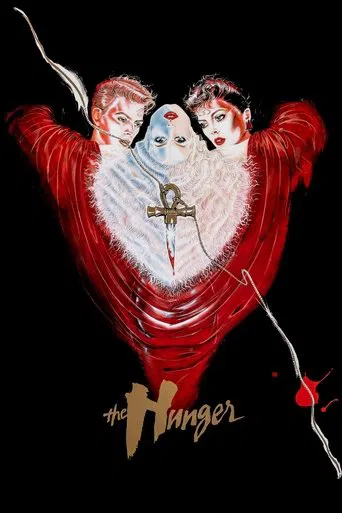

Still waiting to catch David Bowie in a good movie, as his list of screen credits is small but decent enough. I didn't care for "The Man Who Fell to Earth" or the Italian Western "Il Mio West", and now this one makes it three in a row. Actually, Bowie's not in this film all that long, his character John Blaylock ages into decrepitude rather quickly and ominously when he wears out his welcome with vampire supreme Miriam (Catherine Deneuve). The early premise of the story built around Dr. Sarah Roberts (Susan Sarandon) and her research team studying the effects of sleep on the aging process was kind of interesting. I would liked to have had that theme explored a bit more after the crazy monkey killed Betty and ate her. Swear to God, that's in the movie.The reviewers who graded this film highly actually have some good arguments regarding it's artistic merits but this one just didn't do it for me. The best I can point to is the stylized cinematography and rather cool opening 'Bela Lugosi is Dead' treatment, but after that the murky story gets a tad gruesome, even for mature audiences. Sad to say, even well accepted vampire lore gets thrown overboard more than once each time Miriam sees her own reflection in a mirror.
... View MoreAt the time of writing, Dave Bowie has recently died. To describe him as a singer/songwriter doesn't even begin to describe his musical genius – he was a true pioneer, several times over – and he has been widely recognised as such. His acting career, however, has attracted more mixed comment.He initially impressed in Nick Roeg's 'The Man Who Fell to Earth' film, in which he very convincingly played an alien in human form. He was using cocaine regularly during this time and his memory of the film is somewhat hazy – possibly that leant something to his 'out there' performance, which was powerful and desperately fragile at the same time. After a spell on stage playing The Elephant Man (without make-up, using his body and vocal inflections to communicate John Merrick's physical deformity) other parts followed, including that of John Blaylock, partner of Catherine Deneuve's Miriam Blaylock and centuries old vampire in this Tony Scott (brother of Ridley) directed film.Critics have not been kind about 'The Hunger'. The main comment has been that it is 'style over substance'. Whilst the direction, lighting and pace is extremely artistically framed and shot, the storyline is thin at best. But is that a criticism? Not as far as I am concerned. Some of my favourite films are very languid in their telling (a number of them are reviewed here) and surely the lack of a fast pace allows us to become familiar with the characters, their lives, their relationships and the world in which they inhabit. When things happen to them, we care more because we know them better than if their characters had been communicated between spectacular effects shots or a desire to get the story over and done with amidst, as Bowie might say, 'tits and explosions'.So when John Blaylock begins to look his age, it is apparent something is very wrong. It seems Miriam has tired of him somewhat, and he is alone seeking help in a hospital waiting room. The staff at the hospital seem determined not to come to his aid, and in the space of a day, he appears to age 70 years. The make-up and performance are incredible here. As Blaylock's hair comes off in clumps in his hands, as we are given glimpses of the heavy lines appearing and deepening around his eyes, we are witnessing a slow, uncomfortable demise. It is never specifically established that he dies. He is placed in a coffin, now a crumbling shell of a man, by Miriam whilst still showing signs of life – indeed, he appears to haunt her towards the film's end, although this could be an hallucination.Deneuve and Susan Sarandon (whose characters become inter-twined) get the lion's share of screen time – the idea of the eternal vampire living in accepted society has been done a number of times, of successfully so. This is no exception. It's as convincing portrayal of the supernatural existing in our time as any I have seen.
... View MoreAfter developing a special formula, a scientist is invited by secretive vampires to help them with their plans and when their encounters make others curious, they eventually stumbles across their true and tries to save her before she becomes fully integrated into the society.There wasn't much right to this one. The main part to this one was the lesbian relationship having a lot to it. Besides being exposed to a lot of great nudity, there's also the really great scene it happens in. Taking place behind a big veil, it's a much classier and inevitably more romantic scene than the high-end sleaze it easily could've gone to. The strange part of that veil is that it comes into play on another really great scene, the funeral of the other vampire as the veil obscures it enough to tell what's going on but makes it still really impressive when combined with the unique lighting on display. Also among the best parts of the movie was the vampire's resurrection scene, which here is just really cool-looking. Along with its kills, these are the film's positives as this one had a couple problems to it that really hurt this one. The biggest issue with this is the nearly large portion of the film that doesn't have anything exciting happen. Frankly, nearly all of the beginning of the film is just incredibly dull, with almost nothing happening at all as it's mostly just a series of scenes depicting them doing nothing but talking back and forth over whether or not the drug even works at all or how they're going to get closer to her. This really loses its appeal after the first couple times witnessing these scenes over and over, which pretty much make up all of the first half of the film. The whole of these scenes are just ungodly dull due to the repetition of these scenes and it makes them all quite painful to get through. This is pretty much a slow-paced film to being with, taking a fairly long time doing nothing of real importance since the lethargic pace really takes a long toll. This is mostly prevalent for the film's last half when it deals with the relationship between the two as this is long, drawn-out and quite useless. The last part to lower this is the lack of blood and gore with this one is very dry and doesn't have very much that would give it more of a chance to bring in more since the opportunity is hardly ever there anyway. These here are what lower the film.Rated R: Nudity, Graphic Violence, several sex scenes and Language.
... View MoreHey! Like, what in the name of Count Chocula is going on here!?...... Why is it that modern-day movie-vampires are such messy buggers?? They are. When it comes to their favourite drink, Blood-Thick Slurpees, they splatter and spill the stuff around, all over the place, like it was going out of style.Take The Blaylocks (that's the oh-so-refined Bowie/Deneuve vampire team), for example, they get more blood on the walls and on the floor than they ever do in their mouths. I'm not kidding. And half the time they can't even get it into their own mouths at all. Most of it ends up dribbling down their chins and onto the fronts of their very fashionable frocks. (tsk. tsk) I'm tellin' ya - Vogue magazine would never approve of this. Never.The Blaylocks are total mess-cats when it comes to cadaver snacks and full-meal-deals. And not only that, but they are unbelievably reckless and, yes, stupid, too. When these ultra-chic bloodsuckers are finished with their feed for the night they actually haul the torn and chewed up scraps of their dinner down to their cellar and (get this) burn it up in their very own incinerator.I don't know about you, but I'd say that this is none too bright. After all their trendy townhouse is situated right in the centre of a New York City neighbourhood. And unless the locals there have all lost their ability to smell, the stench and smoke caused by the burning of flesh, surely must have 1 or 2 folks around the hood wondering about The Blaylocks' barbecue specials. But the strange thing is, no one ever complains, or anything. I don't get it.In the good, ol' days of movie-vampires (pre-1950's) The Count, Nosferatu and all their assorted cronies always seemed to be so careful whenever they drained a victim of their life-blood. It's true. You rarely ever saw even a trickle of blood run down a vampire's chin or drip from their victim's neck wound. It seemed back in Hollywood's hey-day that these movie-vampires meant business and sucked the body dry. Yeah,'Good To The Last Drop' was their motto, I'm sure. Everything was so clean and easy back then.But these hip-cat movie-vampires of today let the blood fly everywhere, making big, bloody messes from one end of their fashionable condo to the other. What in the world are vampires coming to? And not only that, but Miriam (Mrs. Blaylock) has a neurotic habit of not letting go of her previous lovers. So, whenever she moves from place to place she, literally, lugs around a dozen god-damn coffins that contain the remains of these dried-up deceived ones who she had promised 'forever' to. If a pile of coffins isn't the sort of thing that will draw attention and suspicion to this particular vampire's undead activities, I don't know what will.But Miriam is also big on betrayal and even before her present lover has actually set foot inside his own box she's out shopping for a replacement. She likes to pretend that this isn't so, but she's no fool and, besides, she is utterly repulsed by the touch of old, wrinkled flesh. Who isn't, baby?I have to give Miriam credit for her latest choice for a lover. Sarah (Sarandon) is actually kind of hot, (as opposed to the scrawny Bowie) but on top of that she really seems to have a brain in her head. At present Sarah's working at a clinic and researching the connection between sleep and ageing. This could well prove to be worthwhile research. And I suspect this is one of the reasons why Miriam chose Sarah. Miriam, I'm sure, has very strong desires to slow down her own ageing even more. And maybe Sarah's knowledge is the key to an answer.But as vampire-lovers these two high-fashion females are doomed. Domination is their downfall. One must rule. One must die. Who that is to be all comes down to the one with the more cunning mind. Who that turns out to be will certainly be of no surprise to anyone, I'm sure.Anyways - From a visual point of view 'The Hunger' is a very impressive film to look at and admire. Lots of moody lighting and stylish sets give it an above average look for a mere vampire flick. Director, Tony Scott (Ridley's brother), does a fine job of setting a even pace in the film's story line. And the gore will satisfy any fan of horror movies, in particular the final confrontation between Miriam and all her long-dead and dehydrated lovers. This girl certainly wasn't idle for a minute. And now the mummified lovers are all coming back to 'thank' her for her loyalty. (Tee-Hee)
... View More